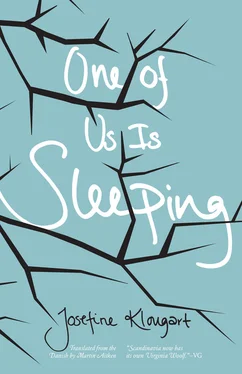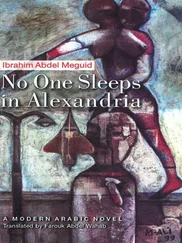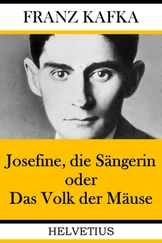A dead man, who will never again be alive for you, but who will continue to breathe his breath into your face without end. And all your kisses will taste of something that was .
He walks at your side, the dead one, sheet-white skin, sheet-white eyes, sheet-white orbs, apples, dangling like droplets. And snow. It is the mind that forgives; the body does not. The body bears its grudges, a maudlin procession of things past, a mourning in the streets. Marrow and bone.
YOU’RE SO YOUNG. Is what she sees the new man thinking. About her, her being so young. Later, he tells her this, though by then it is a repeat, for she has already heard him think the words. They are in her apartment: you’re so young.
She studies him. Sighs and then tells him what she feels to be the truth: that she doesn’t think it’s important. That she has tried to think it is, but simply can’t.
He nods, the same serious expression as hers, accepting the gesture of her nod, as if it were a plate being passed around for the second time, an unconscious plate.
She realizes she is smiling.
She cannot stop herself from smiling, because the thought is beautiful and so heartrendingly naive. It is like placing a sheet over a naked body, allowing friends to search the room, and then to stand there in the doorway afterward, guilt-free. Cleared by a lie: if only we are quiet, offer up our empty hands; and then to encounter this peculiar form of discretion. A will to see the island of bones on the bed through fanned-out fingers that desire not to expose, eyes that will not see , for seeing is an obligation, whose nature remains unclear. And who knows if there is time, perhaps they will prefer to leave in the interim, never to witness the grand finale, the conjuring forth of corpses.
I WAS YOUNG when I fell off a horse and damaged some cartilage. I understood something about the body then, realizing the way the thighbone ends at the knee. Your crumpled cotton shirt shares its colors with the pigeons and the bellies of the sky, the sky as it hangs upon the hills again today — these saturated curtains, and unsettled fogs, bluish breasts, falling as rain.
I wonder again if all your reservations about me are in actual fact the closest you can get to telling me you never wanted this. I never asked for any of it, you whimper in sleep.
The work your body does each day is touching.
You are the most touching thing I know, your lack of serenity moves me. Your looking for ways to push me away from you is touching in a way that has nothing to do with morals or not, nor with responsibility, nor even love, I suppose. Your guilty conscience squirms inside you. I don’t know if you’re telling me the whole truth. But then maybe that’s just how it is, all the time. The truth constantly in flux, and whatever you tell me is true, and everything squirming inside you is, too.
Have you told her, I ask.
You nod, only then to shake your head. I don’t know what to say to her.
I try to convince you you don’t need an excuse not to love someone anymore, that you don’t always have that kind of explanation to provide.
We walk through the city and find the only restaurant open so late. For a moment, you actually look happy.
Thanks, you say, and squeeze my hand under the table.
For what.
You’re right, I don’t need an explanation, I can tell her it’s not her fault, it’s just me. Or you.
I smile at him, and my face; it must have looked dreadful.
You’re beautiful, you say, a whisper almost. Do you know that.
I shake my head, my dreadful face, one of those autumn leaves, where you pull the tissue from the veins, and the ominous skeleton that’s left.
Who am I then, am I someone else now. There is a repetition in the world, and it rides around on the most disquieting steeds; ominous as hell itself. The slightest movements are reflections of the very largest; desolation exists, the betrayer, too, the deception.
I’m unsure if we can ever speak again.
I LAY WITH my head on my new man’s chest. It rose and fell, as unsettled in sleep as from the moment of awakening. I thought about the deckchairs outside. I remember this: waking up a few minutes before him, and the weight of the arm that lay on top of me. A collapsed ceiling. Buried alive, the serenity that must be a part of that, regardless of all else. Having only so much oxygen, a few helpless gasps and one final breath.
When morning came we walked along the shore, crossing some black stones embedded in the green moss; it was as if nature had cultivated itself, and yet one couldn’t help thinking it was so exquisite, the green and the black, that it couldn’t have been cultivated at all, for cultivation presupposes thought, and the uncontrived beauty of this was so convincing .
What is it with you and Berlin, I asked him.
He looked down so as not to stumble, or else he looked down so as to avoid looking at me; I live there, he said after a moment. My son’s mother lives there; my son lives there.
And then I was the one looking down.
He lived in Berlin.
It wasn’t so much the distance that frightened me, it was more this: he actually lives somewhere. He has a life, and I know nothing about it. The concept of occupying a space somewhere, and with it the idea of a home. How a body can belong somewhere; and how you can live in a place and not think of it as home. That perspective, of becoming homeless in that way, being tricked into believing that one thing entails the other, that living somewhere brings about a home. Homelessness is so obviously about something more than just a place to live, and yet the insight hit me hard, like emerging from the backshore in autumn into that sudden vista of sand and ocean, the western sea, Vesterhavet , a view stretching out into the infinite, with nothing to see at all to keep you even anchored in the world. The act of walking on that beach, hearing the rush of the sea, the relentless sound of a head banging against a door, abandoned landscapes, abandoned homes, and dogs that slope about and beg at the table of the sky and these empty dwellings.
What did we talk about.
Certainly not our lives, I thought to myself. My mother. Sweden. His music. The fact that my entire family trembled with grief. That my conscience squirmed inside me. That something was always squirming inside me.
The landscape in which we walked; accumulations of black stones, and in between them fierce green moss and grass, sheep shuffling about on legs of reed.
What is it with you and Copenhagen, I asked then.
I can’t remember wanting anything revealed, I can’t remember wanting to know any truth. But he told me that truth, in a voice that made it seem reasonable to assume it surprised him as much as it did me. This: that he really was someone else’s man now, that there was another woman with us on our walk, another woman in bed with us in the afternoon.
He suffered when I touched him.
He suffered when we stood still on the path and looked into each other’s eyes; it made us understand what exactly it is we do when we look into the eyes of another. We are two vessels connected in such a way as to divide up the pain in equal shares. Seductive, and yet — in one cynical breath: the same sum, the same amount of pain, only more neatly arranged, perhaps.
I’ve got a woman there, I live with her when I’m working in Copenhagen.
We bathed from the rocks. We picked our way out into the bay in our ugly footwear, legs bare. I wanted to skinny-dip, but didn’t. Both of us were more cautious than is good for bathing in such locations. That was what made it such a lovely scene, I think to myself now. Not removing our footwear, wanting to keep a grip. Not being able to make up our minds as to the safest way of getting to the water. All that hesitation.
Читать дальше












